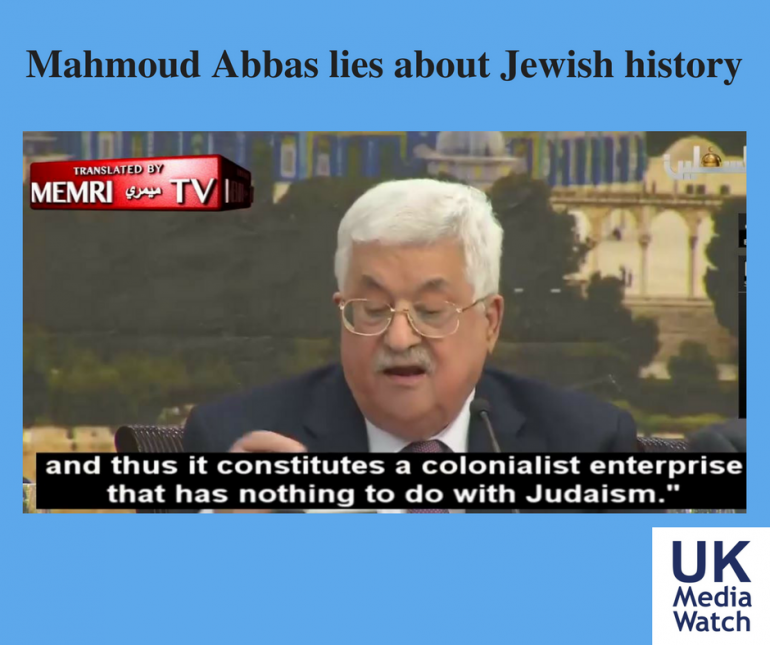There seems to be no limit to the lengths the Guardian will go to obfuscate or excuse Palestinian extremism, incitement or historical revisionism. Their former Middle East Editor, Ian Black, provided his take on Mahmoud Abbas’s recent speech in Ramallah and characteristically airbrushed (or just ignored) the most incendiary and indefensible parts in order to maintain the desired narrative of a ‘moderate’, even “principled”, PA President.
The headline of the Jan. 16th article, “Will Abbas’s ‘Eff off, Trump’ fury play into the hands of rightwing Israelis?”, is classic Guardian – expressing deeper concern over how ‘the Israeli right’ will respond to Abbas’s comments than to the truth or falsehood of his views, or the larger question of its political and ideological implications. As Matti Friedman has explained, within the media echo chamber, what Palestinians do, or what they believe, is not the story. The only actor in the drama who matters is Israel.
You can see this journalistic tick in the way Black introduces Abbas’s controversial remarks.
Israelis quickly condemned an “extremist” or “antisemitic” speech and focused on his description of Zionism as a colonialist movement by people who, he claimed, had no connection to the land they were settling. It was a bleak reminder of the irreconcilable narratives that lie at the heart of the conflict: Israelis and Zionists have always focused on their intentions in creating and maintaining a Jewish state; Palestinians on the results – and primarily the way they were displaced and oppressed by foreign intruders.
Israelis, readers are told, “quickly” condemned Abbas’s speech as extremist or antisemitic, presumably suggesting Israeli reaction was hasty, predictable, as if by rote. Moreover, Black significantly downplays Abbas’s charges. As Dov Lieber, Arab Affairs correspondent for Times of Israel reported, the Palestinian President’s lecture on Zionism alleged that “colonialism created Israel to perform a certain function”. It is a colonial project, Abbas continued, “that has nothing to do with Judaism, but rather used the Jews as a tool under the slogan of the Promised Land.” Contrary to Black’s claim, Abbas’s charge had nothing to do with “irreconcilable narratives”, a term suggesting the veracity of Abbas’s belief that that there’s no Jewish connection to the land can’t be determined.
Abbas also bizarrely accused Israel of drugging Palestinian youth, and even engaged in Holocaust Revisionism – a field in which he has previously excelled – by suggesting that Europe’s Jews were so hostile to Zionism that they chose to to be murdered by Nazis rather than emigrate to pre-state Israel. “The Jews did not want to emigrate even with murder and slaughter. Even during the Holocaust, they did not emigrate. By 1948, Jews in Palestine were no more than 640,000, most of them from Europe,” Abbas said.
This is a lie. As Lieber reminds us, “from 1939 to 1945, the British mandatory authorities prevented most Jewish immigration to Palestine, at the behest of the Arab states”. Millions of Jews didn’t die because they chose to, but because escape routes were closed, due in large part to Arab and Palestinian antisemitism – a visceral hostility to what they clearly perceived as ‘sh**hole’ immigrants.
Abbas also outrageously erased the Farhud and antisemitic incitement and violence that led to the expulsion of Iraqi Jews, and their emigration to Israel, by alleging that Zionist leaders cut deals with Iraqi politicians “to take away the citizenship of Jews and force them to emigrate”.
Abbas additionally maintained that Zionist plans to ethnically cleanse ‘Palestinians’ goes back to Theodor Herzl, the father of modern Zionism. According to Abbas, Herzl once said “We must wipe out the Palestinians from Palestine so that Palestine will be a land without a people for a people without a land.” However, based on our research, this likely is a completely fake quote. Lieber noted that Herzl is not known to have ever advocated for the ethnic cleansing of Palestinians.
Moreover, CAMERA’s Arabic researchers have stressed to us that Abbas’s quotes about the history of the Jewish people are based on an Egyptian antisemitic intellectual named Abdel-Wahab El-Messiri, who, Ben Cohen recently noted, “dedicated his career to denying the existence of an independent Jewish people with political rights”.
However, to Ian Black, even the most insidious accusations within Abbas’s “narrative” are less important than the fact that his speech also “stressed his continuing commitment to a two-state solution”. However, MEMRI’s translation of the speech shows that Black omitted the parts inconsistent with the Guardian framing of Abbas as a Palestinian leader who chose diplomacy over violence. In fact, Abbas talked out of both sides of his mouth. Though he said “we will not call for a military war against Israel”, he also said the following:
Whoever has [weapons] – go ahead and do it. I say this out in the open. If you have weapons, go ahead. I’m with you, and I will help you. Anyone who has weapons can go ahead and I will help you.
Commenting on the significance of Abbas’s address, Daniel Shapiro, former US Ambassador to Israel, wrote, Abbas’s “bizarre description of Israel as colonial creation of European powers, his canard that Israel has no organic connection to Jewish history, is completely inconsistent with any plausible logic of accepting a two-state deal”. Abbas’s belief that “Israel is a foreign implant, which is bound to be temporary”, commented Einat Wilf, helps explain previous Palestinian rejections of Israeli peace plans (by Barak and Olmert) that would have granted them a contiguous state with east Jerusalem as their capital.
Contrary to Black’s fear that Abbas’s speech will “embolden the Israeli right”, it’s more accurate to say that what Abbas revealed about his true beliefs vindicates the political consensus which emerged after the 2nd Intifada (especially after details of Israel’s 2008 peace offer were revealed) among the “Israeli right” – as well as the centre and mainstream left – that a two-state deal which actually brings both peace and security will only be possible when Palestinians embark on a path of real political and intellectual reform, and finally give up their project of erasing the “artificial” Jewish presence in their midst.
Abbas’s diatribe in Ramallah reminds most Israelis that such a time is, quite sadly, not near.
Related Articles
- Novelist Nicholas Blincoe’s Bethlehem Fiction in National Geographic (CAMERA)
- BBC continues to blame Palestinian violence on the US (BBC Watch)
- UK media airbrush Abbas’s hateful comments from report on PLO conference (UK Media Watch)






